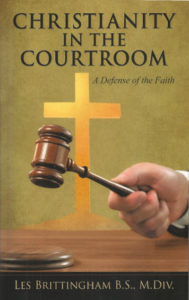In this book, author Les Brittingham takes the reader on a journey of discovering and defending the Christian faith. Relevant topics such as the uniqueness of Christianity; the nature of apologetics; the existence of God; the reliability of biblical documents; the problem of evil; and the evidence for the historical existence and supernatural nature of Christ are discussed in a scholarly, yet easy-to-read format. A compelling case is made that all religions are not the same and that Jesus Christ is the ultimate standard of truth by which all religious thought should be measured. Christianity in the Courtroom is written to Christians who need more confidence in defending their faith in a hostile culture, and to non-Christians who are honestly evaluating and asking questions concerning Christianity.
Christianity in the Courtroom

Price: $18.00
Excerpt: Christianity in the Courtroom
Without the resurrection of Christ, how do we answer these questions?
- How do we explain the change in Peter, who had gone from a denier of Christ living in shame and fear, to a bold proclaimer of the gospel on the Day of Pentecost. He did all of this fully knowing he would be persecuted and even die for his faith, which history records did eventually happen.
- Why did James, the brother of Christ, suddenly become a follower of the Lord and a leader in the early church (Acts 1:13; 12:17; Galatians 2:9)? Previously, according to the Scriptures, Jesus’ family had rejected Him (John 7:5). James is also the author of one of the books in the Bible.
- How do we account for the change in the attitude of the disciples who were willing to die for someone they had previously run from and rejected?
- What is the explanation for how a group of unpretentious disciples could fool the whole world for so long? How do we explain the power of the resurrection for over 2,000 years in the history of mankind? Could a fraud sustain its power for such an enduring period of time?
- Without the resurrection, how do we make sense of the conversion of Paul, a man who had previously hated Christ and persecuted His followers with a vengeance?
- Why did King Agrippa not dispute Paul when he claimed as an historical fact that Jesus had risen from the dead and appealed to Agrippa’s knowledge of the event? (Acts 26:22-27)
- How do we account for the exponential growth of the church over the first three centuries when everything from Judaism, the Roman Empire, paganism, and pseudo-Christianity virulently attacked and persecuted her?
- How do we explain the life-changing power of Christianity in individuals as well as in whole societies for thousands of years?
- How do we explain the change in Peter, who had gone from a denier of Christ living in shame and fear, to a bold proclaimer of the gospel on the Day of Pentecost. He did all of this fully knowing he would be persecuted and even die for his faith, which history records did eventually happen.
- Why did James, the brother of Christ, suddenly become a follower of the Lord and a leader in the early church (Acts 1:13; 12:17; Galatians 2:9)? Previously, according to the Scriptures, Jesus’ family had rejected Him (John 7:5). James is also the author of one of the books in the Bible.
- How do we account for the change in the attitude of the disciples who were willing to die for someone they had previously run from and rejected?
- What is the explanation for how a group of unpretentious disciples could fool the whole world for so long? How do we explain the power of the resurrection for over 2,000 years in the history of mankind? Could a fraud sustain its power for such an enduring period of time?
- Without the resurrection, how do we make sense of the conversion of Paul, a man who had previously hated Christ and persecuted His followers with a vengeance?
- Why did King Agrippa not dispute Paul when he claimed as an historical fact that Jesus had risen from the dead and appealed to Agrippa’s knowledge of the event? (Acts 26:22-27)
- How do we account for the exponential growth of the church over the first three centuries when everything from Judaism, the Roman Empire, paganism, and pseudo-Christianity virulently attacked and persecuted her?
- How do we explain the life-changing power of Christianity in individuals as well as in whole societies for thousands of years?